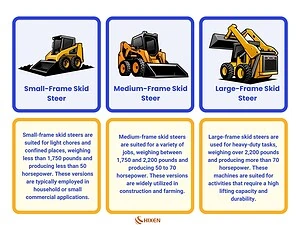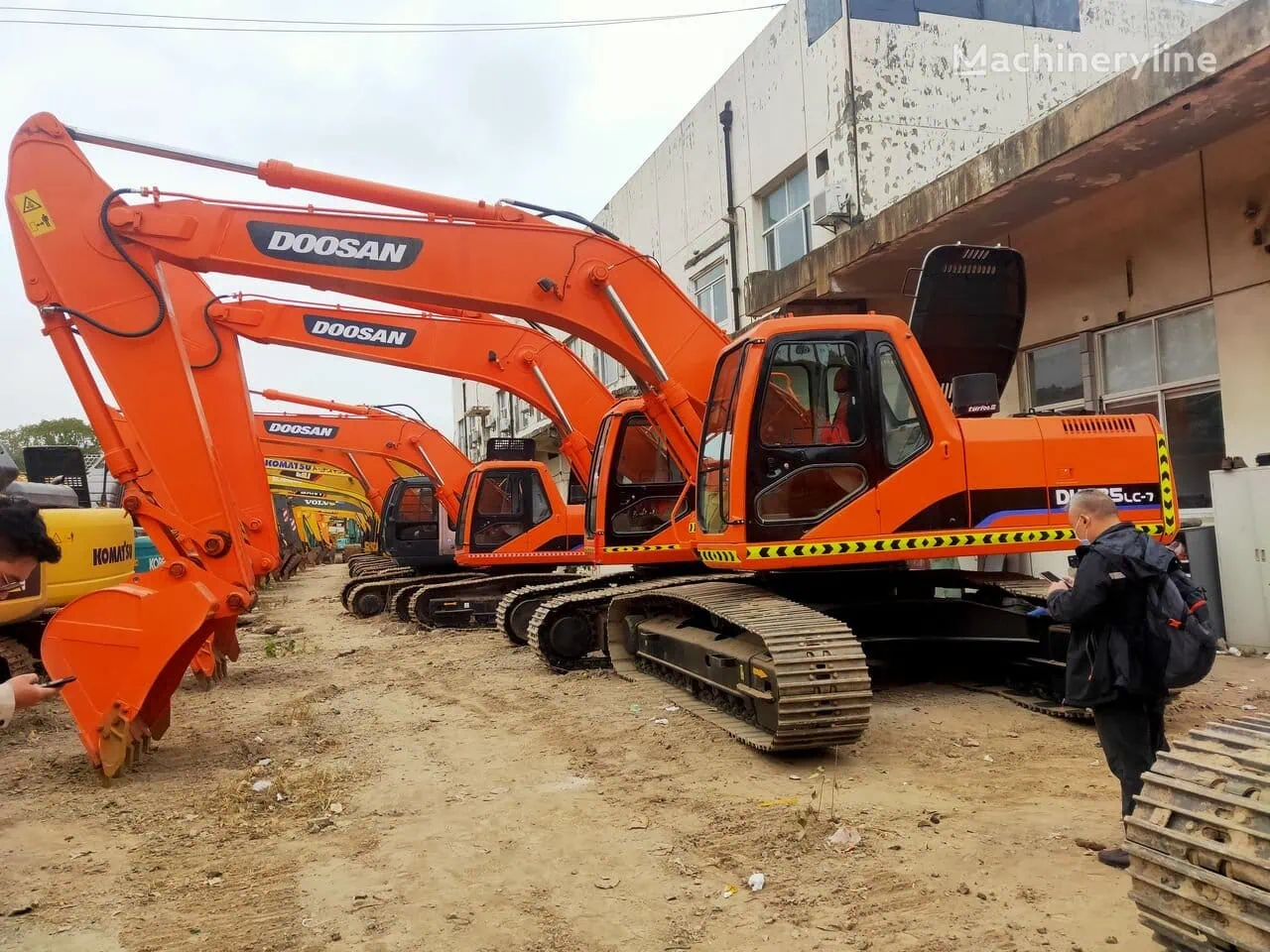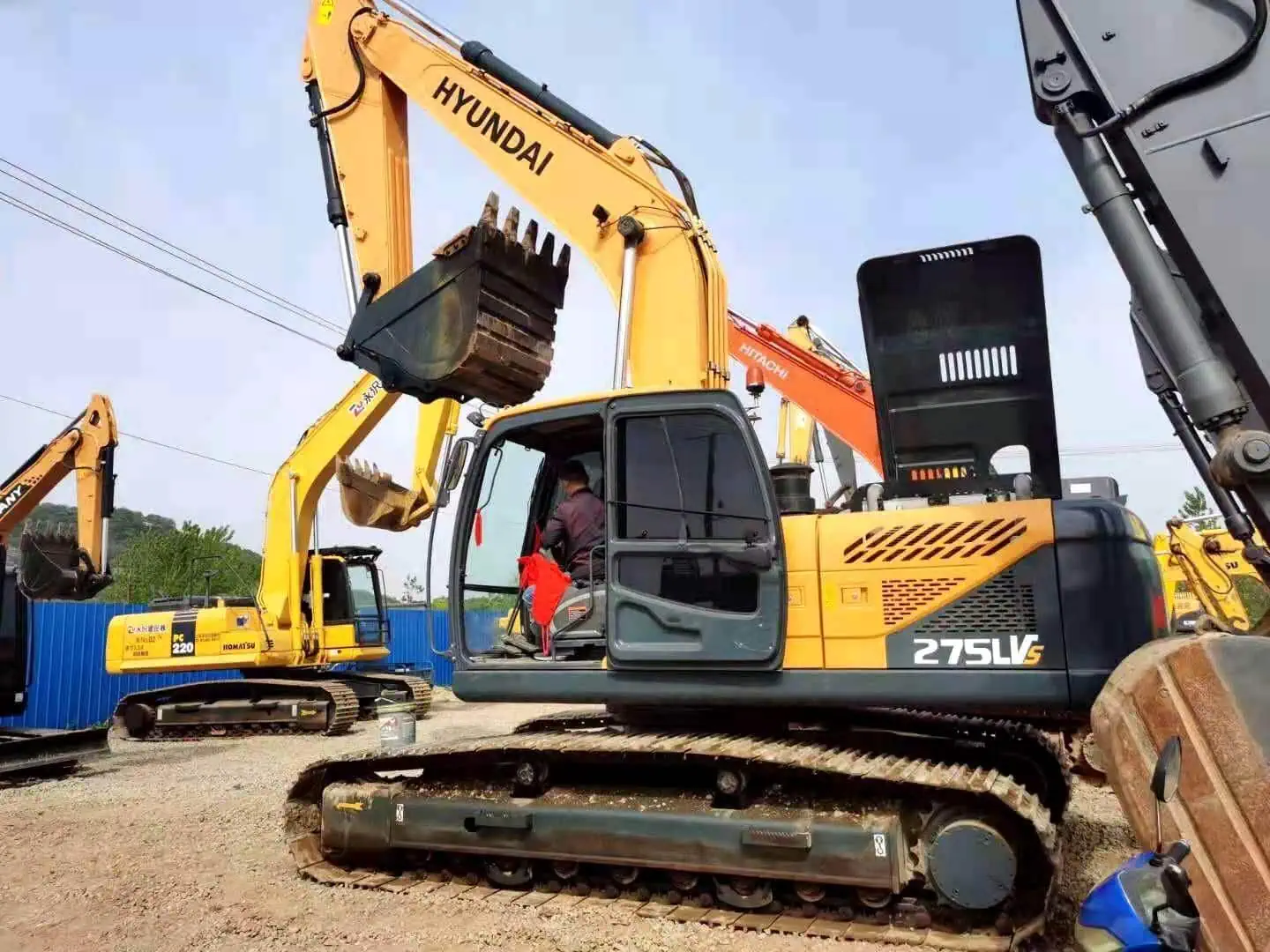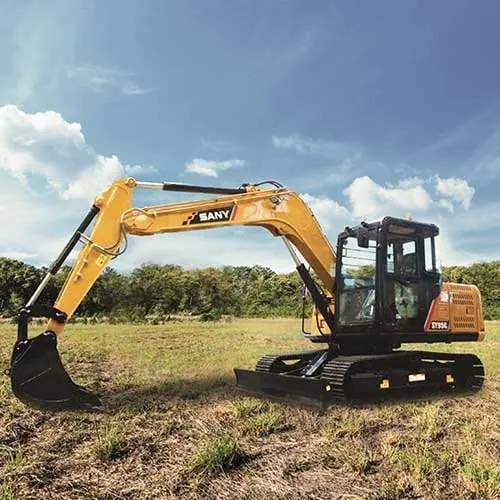Are you thinking about buying a quarrying excavator but are put off by the hefty price? It is critical to understand the elements that determine prices before making a decision. This guide will go over everything from brand selection to long-term costs to help you obtain the best value for your money.
The cost of a quarrying excavator varies significantly depending on factors like brand, size, age, and condition. New machines come with warranties and the latest technology but cost more upfront. Used machines are more affordable but may require more maintenance. This guide compares both options, providing key insights to help you choose wisely and save money.
Continue reading to discover the aspects that determine quarrying excavator pricing and how to make an informed purchasing decision.
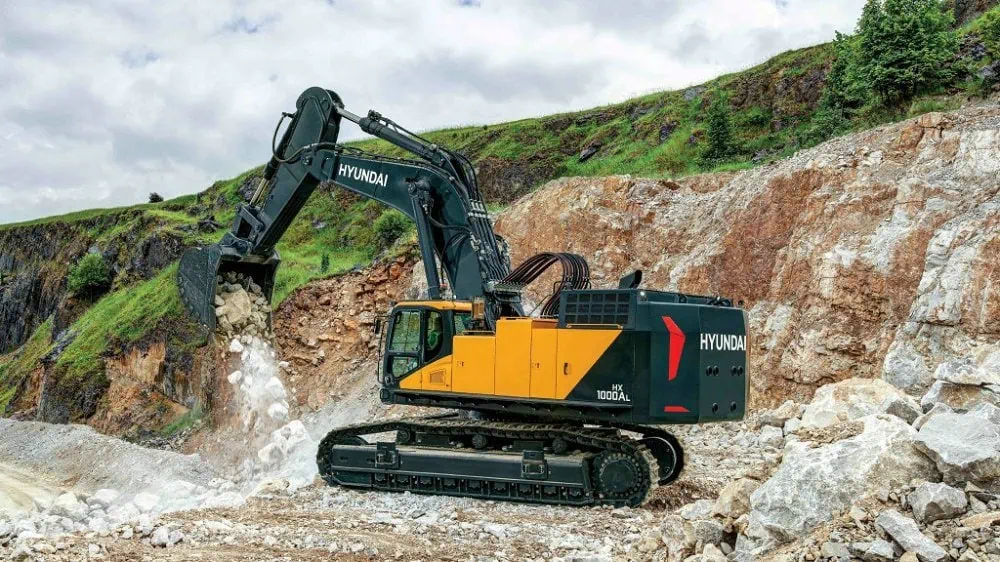
Table of Contents
ToggleFactors That Influence the Cost of a Quarrying Excavator
Brand and Model
One of the most important elements influencing the cost of a quarrying excavator is the brand and model. Some manufacturers charge a premium because of their reputation for durability, performance, and after-sales service. For example, companies such as Caterpillar (CAT), Komatsu, and Volvo are known for their quality and innovation, which raises their prices. However, these expensive versions frequently include advanced features and long lifespans, making them a sound long-term investment.
In comparison, more budget brands like XCMG and Liugong give lower-priced solutions that still offer fantastic performance, but may not have the same advanced features or long-term support accessible through the manufacturer. The costs and key features of different brands are broken down below:
| Brand | Average Price Range (New) | Key Features |
|---|---|---|
| Caterpillar (CAT) | $150,000 – $500,000 | Advanced hydraulics, fuel efficiency, long lifespan |
| Komatsu | $120,000 – $450,000 | Robust design, fuel efficiency, operator comfort |
| Volvo | $100,000 – $400,000 | Environmentally friendly, comfortable cabins |
| XCMG | $90,000 – $350,000 | Cost-effective, reliable, great for heavy tasks |
| Liugong | $80,000 – $300,000 | Affordable, easy maintenance, durable |
This table allows readers to rapidly compare the prices and features of several quarrying excavator brands, supporting them in making an informed decision.
New vs. Used Quarrying Excavators
When purchasing a quarrying excavator, another major decision is whether to buy a new or used machine. New excavators have the advantage of being in pristine condition with cutting-edge technology, whereas used excavators are less expensive but have some wear and tear.
New machines come with warranties, the newest technological features, and fewer working hours. They are great for purchasers searching for maximum efficiency, minimal maintenance expenses, and cutting-edge features.
Used machines, on the other hand, are typically 30% to 60% less expensive than new ones, depending on their condition. However, used machines may require more regular repairs, and there is always the possibility of hidden issues, particularly with older models. Below, I’ve provided a table to compare the merits and cons of new and used quarrying excavators:
| Condition | Advantages | Disadvantages | Price Range |
|---|---|---|---|
| New | Latest technology, warranty, higher resale value | Higher initial cost, faster depreciation | $150,000 – $500,000 |
| Used | Lower initial cost, slower depreciation | Potential for repairs, unknown history | $50,000 – $300,000 |
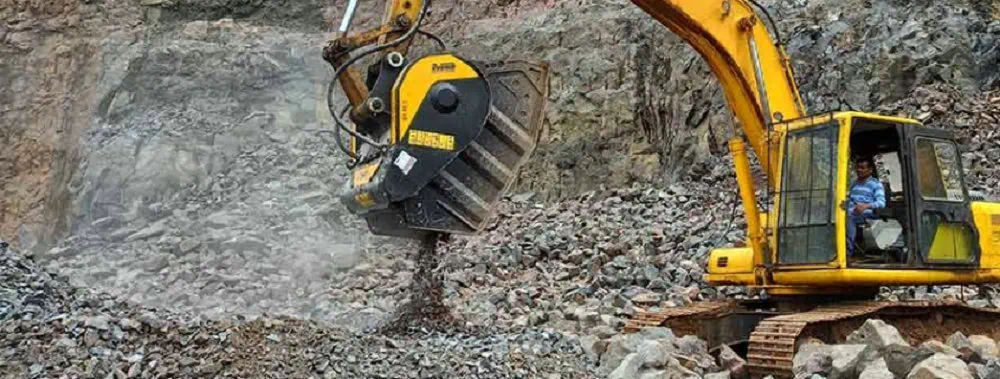
Size, Capacity, and Attachments
Excavators with specialized attachments, such as hydraulic hammers, grapples, or rock buckets, are also more expensive because they are designed for more specific tasks in the quarrying and mining industries. The price of a quarrying excavator is significantly influenced by its size and capacity; larger excavators capable of lifting heavier loads or handling more material will naturally cost more.
Here’s a breakdown of the price range based on size and capacity, along with some of the most common attachments:
| Excavator Size | Price Range (New) | Common Attachments |
|---|---|---|
| Small (10-20 tons) | $80,000 – $150,000 | Standard Bucket, Grapple |
| Medium (20-30 tons) | $150,000 – $300,000 | Hydraulic Hammer, Quick Coupler, Heavy Duty Bucket |
| Large (30+ tons) | $250,000 – $500,000 | Rock Bucket, Demolition Grapple, Extended Boom |
Larger excavators are meant for more demanding quarrying jobs, such as digging through rock, shattering material, and moving enormous amounts of earth. Specialized attachments increase the versatility of these machines, allowing them to tackle a variety of duties inside the operation, from breaking rocks to transporting huge aggregates.
Condition and Age (for Used Machines)
A used excavator that has been well-maintained can still serve a quarry operation for many years, but it’s important to thoroughly inspect the equipment. Older machines with high hours on the engine and worn-out components will cost less than newer models, but they may require more frequent repairs and intensive maintenance.
Here’s a detailed breakdown of used machines based on age and operational hours:
| Age | Price Range | Operational Hours | Potential Issues |
|---|---|---|---|
| 0-2 years | $250,000 – $350,000 | 1,000 – 2,000 hours | Minimal wear, low risk of major repairs |
| 3-5 years | $150,000 – $250,000 | 2,000 – 5,000 hours | Some wear on components, more maintenance needed |
| 6+ years | $50,000 – $150,000 | 5,000+ hours | Potential engine or hydraulic issues, higher repair costs |
Older machines, especially those with more operational hours, may be more prone to engine wear, hydraulic system problems, and track issues. If you’re thinking about buying a used machine, ask the seller for a complete service history and have a mechanic inspect the equipment for any potential red flags.
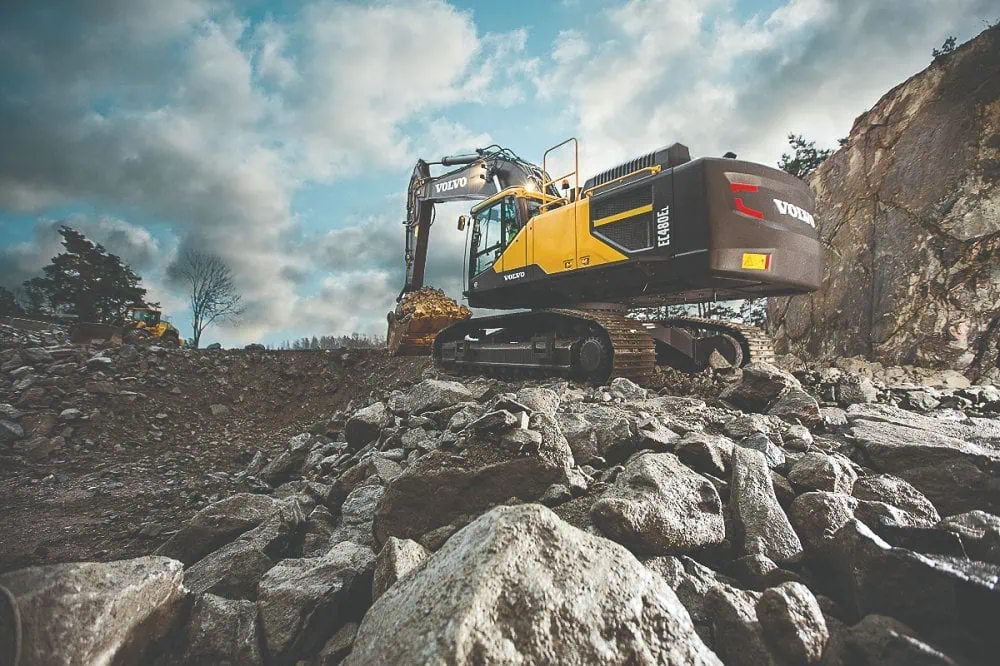
Typical Price Range for Quarrying Excavators
The price of a quarrying excavator depends heavily on criteria such as the machine’s condition, size, and brand. Here’s a breakdown of the average price range for both new and used quarrying excavators:
| Condition | Price Range (New) | Price Range (Used) |
|---|---|---|
| Small (10-20 tons) | $80,000 – $150,000 | $40,000 – $100,000 |
| Medium (20-30 tons) | $150,000 – $300,000 | $75,000 – $150,000 |
| Large (30+ tons) | $250,000 – $500,000 | $100,000 – $250,000 |
As you can see, the machine’s size and age have a considerable effect on its price range. Small quarrying excavators (10-20 tons) are the most economical, whereas larger machines (30+ tons) are more expensive.
New vs. Used Quarrying Excavators: Which Is More Cost-Effective?
When comparing the cost-effectiveness of new vs. used quarrying excavators, it’s critical to measure the initial savings of buying a used machine against the long-term expenditures of repairs and maintenance.
Advantages of Buying New
| Benefit | Description |
|---|---|
| Warranty | New machines come with a warranty that covers repairs for a set period, making them less risky for buyers. |
| Technological Advancements | New machines feature the latest technology, improving efficiency, reducing fuel consumption, and lowering emissions. |
| Longevity | New machines are expected to last longer, with fewer repairs required during the initial years. |
When you choose a new quarrying excavator, the initial cost is more, but you gain piece of mind knowing that the machine is backed by a warranty and is outfitted with cutting-edge technology. Furthermore, the longer lifespan means less maintenance in the early years.
Advantages of Buying Used
| Benefit | Description |
|---|---|
| Lower Initial Cost | Used machines are generally 30% to 60% cheaper than new machines. |
| Lower Depreciation | Used machines have already gone through most of their depreciation, which means you won’t lose as much in value. |
| Faster Availability | Used machines are often readily available for immediate purchase, unlike new ones that may require longer lead times. |
However, purchasing a used equipment presents its own set of issues. The reduced initial cost may be attractive, but it is critical to perform a comprehensive inspection. Used equipment may have hidden faults that will require costly repairs in the future. It is critical to properly assess the machine’s overall condition and remaining lifespan.
How Much Does a Used Quarrying Excavator Cost?
The price of a used quarrying excavator can vary widely depending on various aspects such as age, hours worked, brand, and general condition. Below, we’ll break down what you might anticipate to pay based on the machine’s age, allowing you to evaluate a fair price before purchasing.
| Age | Price Range | Potential Issues |
|---|---|---|
| 1-2 years | $250,000 – $350,000 | Few issues, great for long-term use. Minimal wear, usually comes with some warranty. |
| 3-4 years | $150,000 – $250,000 | Requires more maintenance, slightly reduced value. Still in good condition but might need attention to components like hydraulics or engine parts. |
| 5+ years | $50,000 – $150,000 | Older components, higher risk of needing repairs. Consider possible replacements for high-use parts. |
Used quarrying excavators in the 1-2 year range are often nearly as good as new, making them an excellent choice for people looking for a relatively new equipment without having to spend the entire price for a brand-new one. As the machine matures, its price falls, but so does the longevity of its components.
Things to Consider When Buying a Used Quarrying Excavator
When purchasing a used quarrying excavator, it’s important to consider the number of hours the machine has worked, its maintenance history, and its overall condition. Machines that have been well-maintained and used in less demanding environments may still have a long life ahead of them, even if they are older.
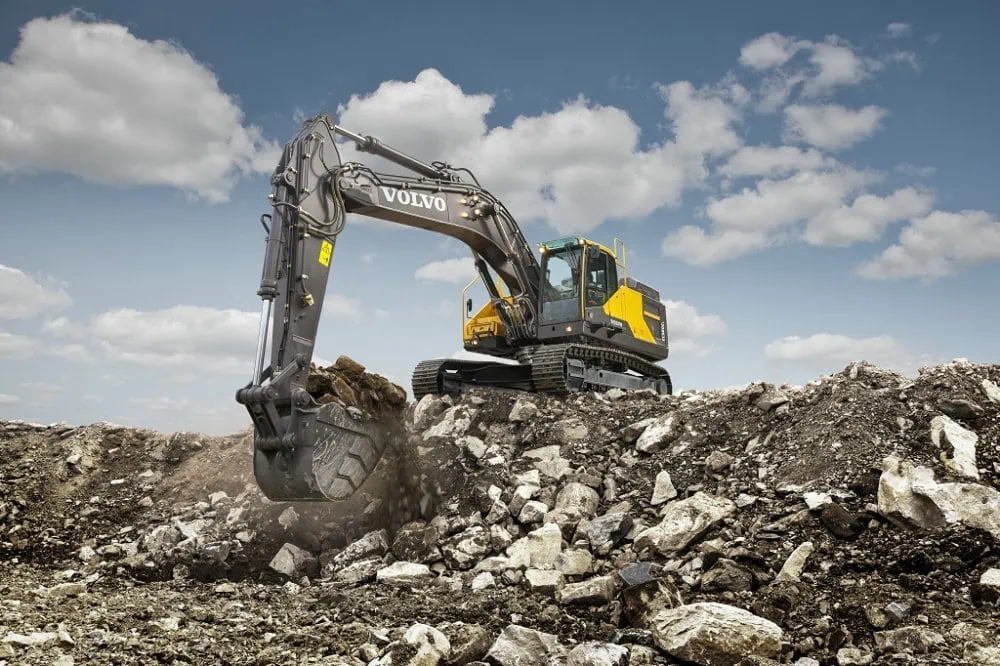
Why Quarrying Excavators Are Pricier Than Standard Construction Excavators
Quarrying excavators are specifically designed to withstand tough working conditions. These specialist machines are built to withstand the extreme stress and strain seen in quarries and mines, which accounts for their higher cost when compared to standard construction excavators.
| Factor | Description |
|---|---|
| Built for Harsh Environments | Quarrying excavators are built to withstand extreme wear, high pressure, and the corrosive elements often found in quarries. |
| Advanced Features for Heavy Duty | These machines are designed for tough jobs, often equipped with reinforced parts and heavy-duty hydraulics. |
| Larger Dimensions and Capacity | Quarrying excavators are often larger with increased lifting and digging capacities, making them more expensive than standard models. |
Quarrying excavators, unlike normal construction excavators, must be strong enough to lift huge loads, dig in tough terrains, and work in dense, rocky soil. These challenging tasks necessitate more robust engineering, raising the overall cost.
Specialized Features of Quarrying Excavators
| Feature | Description |
|---|---|
| Reinforced Structures | Quarrying excavators have reinforced bodies, frames, and undercarriages designed to withstand the wear and tear of rocky, uneven terrains. |
| Increased Lifting Capacity | These machines are designed to lift and move larger and heavier loads compared to standard excavators, sometimes up to 30% more. |
| Enhanced Durability | With reinforced hydraulic systems and heavy-duty tracks, quarrying excavators are built for continuous use in tough, high-impact environments. |
In a quarry, machinery is continually subjected to tremendous stress, making durability and specialized features essential. The added weight, stronger steel, and enhanced lifting capacity are critical for carrying heavy loads and avoiding damage under difficult situations.
Maintenance and Repair Costs for Quarrying Excavators
Owning a quarrying excavator requires frequent maintenance to preserve the machine’s longevity and reliability. Quarrying machines’ components are more prone to wear and tear than ordinary construction excavators, potentially resulting to higher repair expenses.
| Component | Maintenance Frequency | Average Cost of Repair |
|---|---|---|
| Hydraulic System | Every 2,000-4,000 hours | $10,000 – $30,000 |
| Engine | Every 4,000-5,000 hours | $15,000 – $50,000 |
| Tracks | Every 5,000 hours | $20,000 – $40,000 |
| Undercarriage | Every 4,000 hours | $12,000 – $25,000 |
Owning a quarrying excavator requires frequent maintenance to preserve the machine’s longevity and reliability. Quarrying machines’ components are more prone to wear and tear than ordinary construction excavators, potentially resulting to higher repair expenses.
Factors Affecting Maintenance Costs
- Machine Usage: Higher usage and longer working hours lead to faster wear and tear.
- Environment: Quarrying operations often involve abrasive materials that cause greater stress on the machine.
- Brand: Some brands like CAT and Komatsu may have more affordable parts or readily available service providers, reducing long-term maintenance costs.
Fuel Efficiency of Quarrying Excavators
Fuel consumption is another important consideration when determining the entire cost of owning a quarrying excavator, as these machines burn a lot of fuel, especially during heavy-duty activities in quarries.
| Brand | Average Fuel Consumption (L/hr) | Fuel Efficiency Ranking |
|---|---|---|
| CAT | 25-35 liters | High efficiency for large machines |
| Komatsu | 22-32 liters | Moderate efficiency with durable engines |
| XCMG | 20-30 liters | Lower efficiency compared to premium brands |
Fuel efficiency varies depending on machine size, engine type, and the sort of work being performed. Larger excavators use more fuel, but their higher capacity can sometimes offset the cost, particularly for large-scale projects.
Optimizing Fuel Use
- Engine Efficiency: Modern quarrying excavators come with advanced engines designed to maximize fuel efficiency.
- Maintenance: Well-maintained engines are more fuel-efficient. Regular checks on air filters, hydraulic systems, and engine oil can help reduce fuel consumption.
- Load Management: Operating the excavator at the optimal load for its size can prevent unnecessary fuel use.
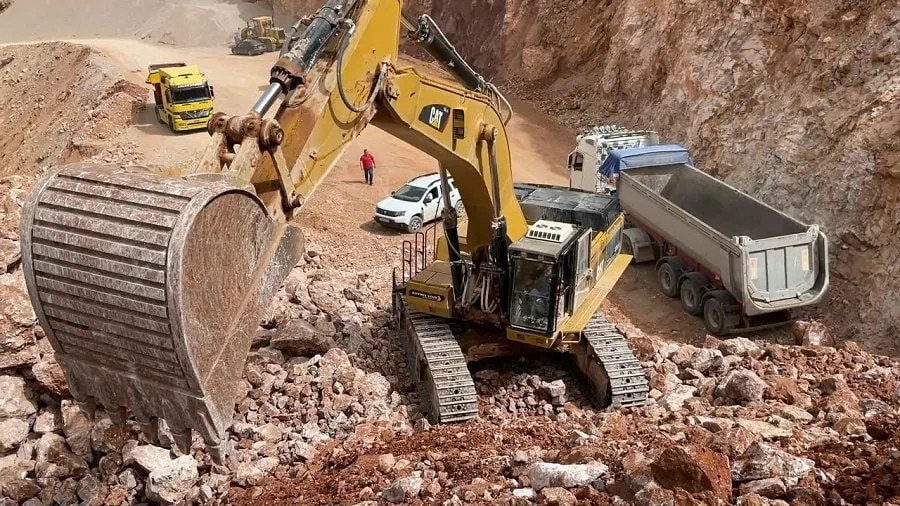
The Importance of Choosing the Right Brand
When selecting a quarrying excavator, brand reputation is crucial. Leading brands such as Caterpillar (CAT) and Komatsu provide machines developed for harsh settings, which are often considered more robust and reliable. However, there are more economical solutions available, such as XCMG and SANY, which offer fantastic value for money, particularly if you’re looking for a secondhand machine.
| Brand | Reputation | Typical Price Range | Pros |
|---|---|---|---|
| CAT | Excellent | $250,000 – $500,000 | High reliability, longer lifespan, strong resale value. |
| Komatsu | Excellent | $230,000 – $450,000 | Durable, great after-sales service, easy to maintain. |
| XCMG | Good | $100,000 – $250,000 | Affordable, good for less demanding projects, lower maintenance costs. |
| SANY | Good | $90,000 – $220,000 | Cost-effective, strong performance in various conditions. |
Choosing the proper brand depends on your budget, the unique demands of your quarrying job, and the long-term costs you’re ready to endure. While premium brands like CAT and Komatsu may be pricey upfront, their durability and excellent resale value can make them attractive investments in the long run.
Long-Term Costs Beyond the Initial Price
While the initial cost is an important aspect in selecting a quarrying excavator, it is not the only one to consider. Long-term costs including as maintenance, fuel, and insurance may also influence your selection.
Maintenance and Repairs
A quarrying excavator requires regular maintenance to ensure it runs smoothly. While new machines typically require less repairs at first, they still require routine maintenance, especially when utilized in tough locations such as quarries. Here’s a table that displays the average maintenance and replacement expenses for important components:
| Component | Average Replacement Cost |
|---|---|
| Tracks | $15,000 – $30,000 |
| Engine Overhaul | $50,000 – $100,000 |
| Hydraulic System | $20,000 – $50,000 |
When planning for a quarrying excavator, keep these costs in mind because they can accumulate over time. While regular maintenance will increase the lifespan of your machine, repairs, particularly for larger parts, can be costly.
Fuel Efficiency
Another major ongoing expense is fuel consumption. Different types and models of quarrying excavators have varying levels of fuel efficiency. The more fuel-efficient a machine, the lower your running costs will be over time. The following is a comparison of fuel consumption for prominent quarrying excavators brands:
| Brand | Fuel Efficiency (Liters per hour) |
|---|---|
| CAT | 20-30 liters |
| Komatsu | 18-28 liters |
| XCMG | 22-32 liters |
Fuel consumption varies according to the machine’s size and kind, as well as the nature of the task being performed. For example, larger machines would normally consume more fuel per hour, but they may be more efficient in large, high-demand projects.
Insurance Costs
Insurance is another key consideration when purchasing a quarrying excavator. Both new and used devices require coverage, although premiums vary depending on the machine’s age, condition, and usage.
| Machine Type | Average Annual Insurance Cost |
|---|---|
| New Excavator | $8,000 – $15,000 |
| Used Excavator | $5,000 – $10,000 |
Used machines are often less valuable than new machines, thus insurance prices are lower. However, because of their sophisticated safety features, newer machines may benefit from more complete insurance alternatives.
Conclusion
The cost of a quarrying excavator varies based on factors such as brand, condition, size, and attachments. New machines are more expensive but offer benefits such as warranties and cutting-edge technology. Used machines are less expensive but require careful inspection to ensure reliability. Understanding these factors and evaluating both options can help you make an informed decision that meets your needs and budget.



